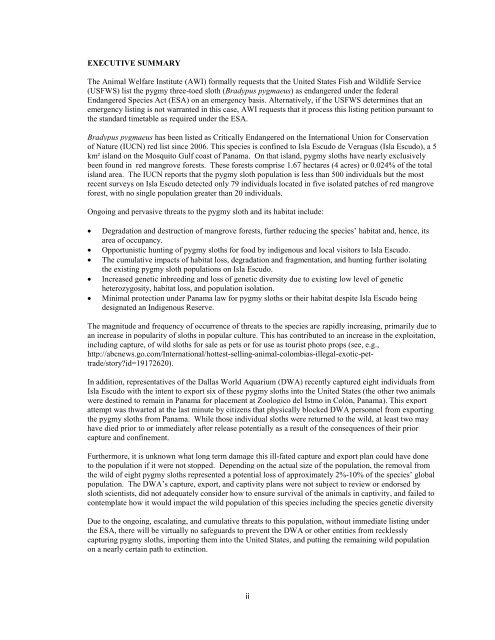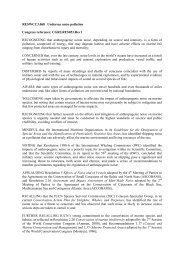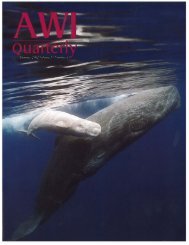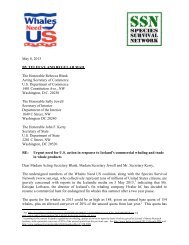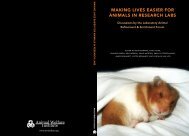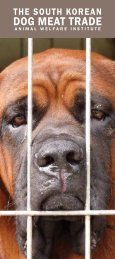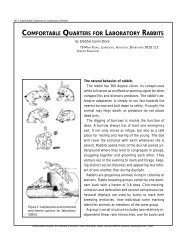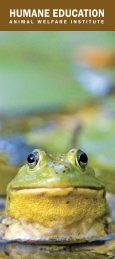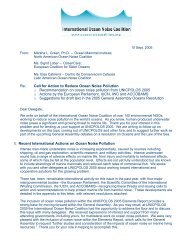EMERGENCY PETITION TO LIST THE PYGMY THREE-TOED SLOTH
EMERGENCY PETITION TO LIST THE PYGMY THREE-TOED SLOTH
EMERGENCY PETITION TO LIST THE PYGMY THREE-TOED SLOTH
You also want an ePaper? Increase the reach of your titles
YUMPU automatically turns print PDFs into web optimized ePapers that Google loves.
EXECUTIVE SUMMARYThe Animal Welfare Institute (AWI) formally requests that the United States Fish and Wildlife Service(USFWS) list the pygmy three-toed sloth (Bradypus pygmaeus) as endangered under the federalEndangered Species Act (ESA) on an emergency basis. Alternatively, if the USFWS determines that anemergency listing is not warranted in this case, AWI requests that it process this listing petition pursuant tothe standard timetable as required under the ESA.Bradypus pygmaeus has been listed as Critically Endangered on the International Union for Conservationof Nature (IUCN) red list since 2006. This species is confined to Isla Escudo de Veraguas (Isla Escudo), a 5km² island on the Mosquito Gulf coast of Panama. On that island, pygmy sloths have nearly exclusivelybeen found in red mangrove forests. These forests comprise 1.67 hectares (4 acres) or 0.024% of the totalisland area. The IUCN reports that the pygmy sloth population is less than 500 individuals but the mostrecent surveys on Isla Escudo detected only 79 individuals located in five isolated patches of red mangroveforest, with no single population greater than 20 individuals.Ongoing and pervasive threats to the pygmy sloth and its habitat include:Degradation and destruction of mangrove forests, further reducing the species’ habitat and, hence, itsarea of occupancy.Opportunistic hunting of pygmy sloths for food by indigenous and local visitors to Isla Escudo.The cumulative impacts of habitat loss, degradation and fragmentation, and hunting further isolatingthe existing pygmy sloth populations on Isla Escudo.Increased genetic inbreeding and loss of genetic diversity due to existing low level of geneticheterozygosity, habitat loss, and population isolation.Minimal protection under Panama law for pygmy sloths or their habitat despite Isla Escudo beingdesignated an Indigenous Reserve.The magnitude and frequency of occurrence of threats to the species are rapidly increasing, primarily due toan increase in popularity of sloths in popular culture. This has contributed to an increase in the exploitation,including capture, of wild sloths for sale as pets or for use as tourist photo props (see, e.g.,http://abcnews.go.com/International/hottest-selling-animal-colombias-illegal-exotic-pettrade/story?id=19172620).In addition, representatives of the Dallas World Aquarium (DWA) recently captured eight individuals fromIsla Escudo with the intent to export six of these pygmy sloths into the United States (the other two animalswere destined to remain in Panama for placement at Zoologico del Istmo in Colón, Panama). This exportattempt was thwarted at the last minute by citizens that physically blocked DWA personnel from exportingthe pygmy sloths from Panama. While those individual sloths were returned to the wild, at least two mayhave died prior to or immediately after release potentially as a result of the consequences of their priorcapture and confinement.Furthermore, it is unknown what long term damage this ill-fated capture and export plan could have doneto the population if it were not stopped. Depending on the actual size of the population, the removal fromthe wild of eight pygmy sloths represented a potential loss of approximately 2%-10% of the species’ globalpopulation. The DWA’s capture, export, and captivity plans were not subject to review or endorsed bysloth scientists, did not adequately consider how to ensure survival of the animals in captivity, and failed tocontemplate how it would impact the wild population of this species including the species genetic diversityDue to the ongoing, escalating, and cumulative threats to this population, without immediate listing underthe ESA, there will be virtually no safeguards to prevent the DWA or other entities from recklesslycapturing pygmy sloths, importing them into the United States, and putting the remaining wild populationon a nearly certain path to extinction.ii


